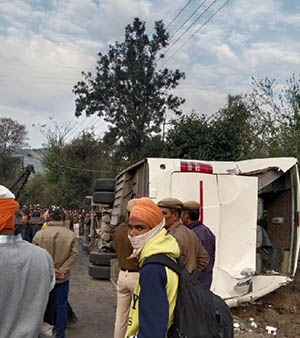Indian Institute of Technology Madras Centre of Excellence for Road Safety (CoERS has targeted at training over 2000 school bus drivers, using simulators and apps. It has bolstered hopes to achieve lofty target of making the cities zero-accident in due course of time if it goes as targeted.
This intervention by India’s top IIT has come as a “handy model” for others in rest of India, mainly the Himalayan states.
Police traffic and railways, transport department need to emulate it vigorously to prevent the rising number of fatalities in the mountain states, mainly Himachal and Uttarakhand, where on an average more than 1000 precious lives are lost in road accidents every year.
Centre of Excellence in Road Safety (CoERS) at IIT Madras is funded by the Ministry of Road Transport and Highways (MoRTH), Government of India to improve road safety through evidence-based, integrated approach.
CoERS works on various aspects of human factors engineering, road engineering and vehicle engineering to bring about significant improvements in road safety globally.
This CoE also advices various stakeholders and Governments to bring about a data-driven systems approach to road safety.
As a matter of fact, IIT Madras is partnering with SNS Foundation.
They will build up on capacity and capability improvement, Research and Development on Human Behavioural Aspects of Road Safety, the most critical aspect of road fatalities in India.
For one thing, if one goes by the studies on road accidents, over 95 per cent are caused by the Human error of judgement.
The bad narrow roads and over-speeding and reckless driving are factors that add to the error of judgement on the part of the erring drivers.
It is for the first time that IIT has chipped in for road safety in which a focus is on school bus drivers.
Sarathi, Group President, Anand Group, Joint Managing Director, M/S HLMAIL, said “As an automotive components manufacturer working in safety systems, we are deeply concerned with the number of accidents and fatalities on road”.
“As socially responsible organisations, we are happy to partner with the Centre of Excellence for Road Safety to work on research on direct intervention to improve stakeholder capacity and capabilities in India”.
“We look forward to having a long-term role in this journey towards safe roads in India”, he added.
IIT Madras expects good results from this collaboration.
“Build a simulator-based curriculum and delivery for training of trainers on road safety rules”,
They will also be trained on driving etiquette and behaviour for school and college buses and vans in and around Chennai as a part of research.
Since they are in contact with children at an impressionable age, this can help in developing adherence to road rules.
They will nurture ideas in the field of road safety. It will help mature them into products, using the CoERS ecosystem by organising hackathons that can identify promising ideas and mature them to the prototype stage.
Highlighting the need for such collaborations, Prof. Manu Santhanam, Dean (Industrial Consultancy and Sponsored Research), IIT Madras, said, “Recently, there is a lot of coverage in the news media about road accidents, which happen despite good roads”.
“Not just in Tamil Nadu but across India, there are many accidents and fatalities that are avoidable”. “A lot has to be done with respect to driver behaviour and enhancing vehicular safety.”
Prof. Santhanam further was quoted as saying, “We also need to increase the awareness among people about how they utilise the road resources provided”.
There are different interventions being done at different levels, including policy work.
These aspects of driver behaviour will help train people to understand what it takes to have a safe driving approach.
“We need to work on safety from various different approaches”.
This presents an opportunity for the Centre of Excellence for Road Safety to bring out all the challenges towards the goal of having zero accidents.
Prof. Venkatesh Balasubramanian, Head, CoERS and Professor, RBG Labs, Department of Engineering Design, IIT Madras, who is coordinating on this initiative said, “The key components involved in having safe roads are the vehicle, infrastructure and human interaction with the two”.
While there has been significant research and development in vehicle and road engineering, there is a significant opportunity for improvements in Human Behavioural Aspects.
“In this partnership, we aspire to train drivers who shall be further training impressionable children during their transit on the road to school”.
“We hope this intervention will result in not only development of participants, but also help put together an objective driver training manual for drivers involved with logistics operations, particularly with impressionable children.”




